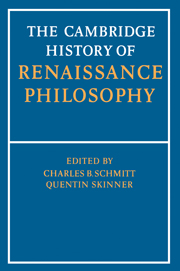Introduction
Published online by Cambridge University Press: 28 March 2008
Summary
As the scale of this volume attests, the period of the Renaissance was one of intense philosophical activity. It is only recently, however, that the extent of this activity has come to be recognised fully. Although eighteenth-century historians of philosophy such as Jakob Brucker saw in the Renaissance an important period of reorientation, their awareness did not in general carry over into nineteenth-century attempts at historical synthesis. Burckhardt's celebrated essay remained virtually silent about the contributions of philosophy to the civilisation of the Renaissance, while Anglo-Saxon traditions of scholarship generally treated the two centuries after the death of William of Ockham, if at all, merely as a backdrop to the heroic age of Francis Bacon and the ‘new philosophy’. A few Renaissance thinkers – Ficino, Bruno, Campanella – occasionally found a place in nineteenth-century histories, but even then the interpretation of their work tended to remain deficient in several respects. One problem was that the kind of historical research needed to make possible a comprehensive evaluation of Renaissance philosophy largely remained to be carried out. A further weakness derived from the fact that most nineteenth-century historians were more interested in tracing the roots of ‘modern’ thought than in considering the ebb and flow of philosophical teaching and speculation at different times. Even when Renaissance writers were discussed, they were generally treated as pawns in the philosophical battles of later centuries, not as thinkers of their own age and in their own right.
- Type
- Chapter
- Information
- The Cambridge History of Renaissance Philosophy , pp. 1 - 6Publisher: Cambridge University PressPrint publication year: 1988



